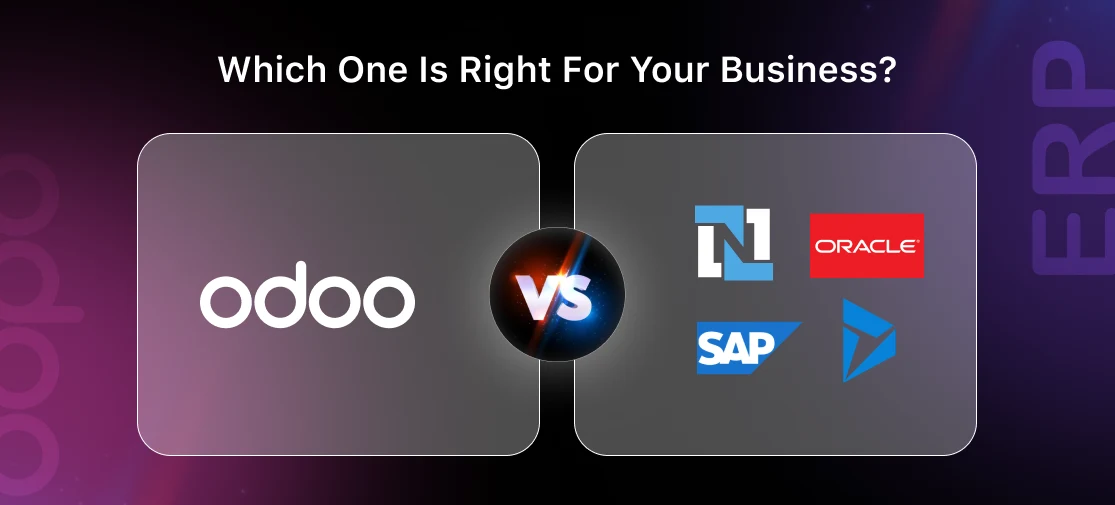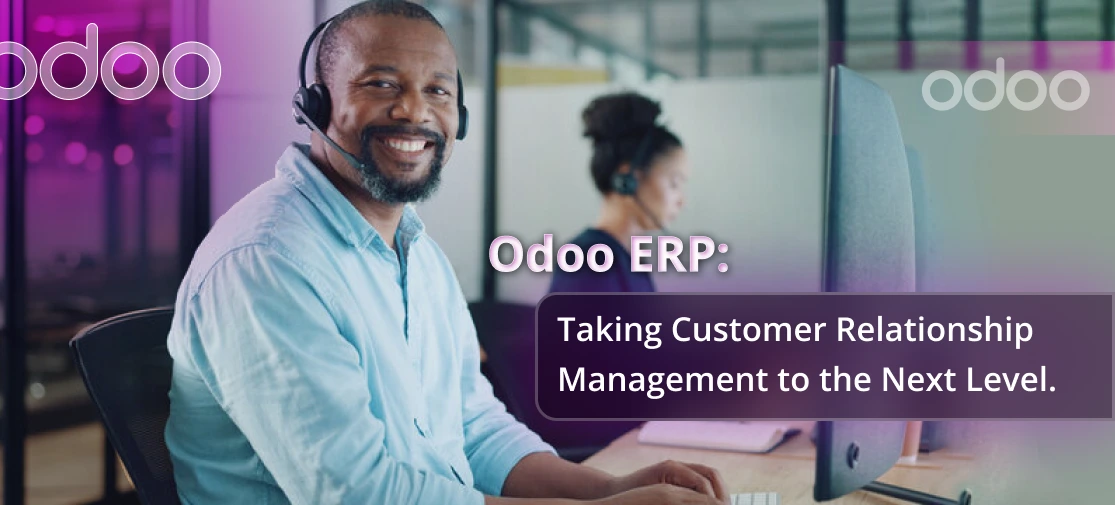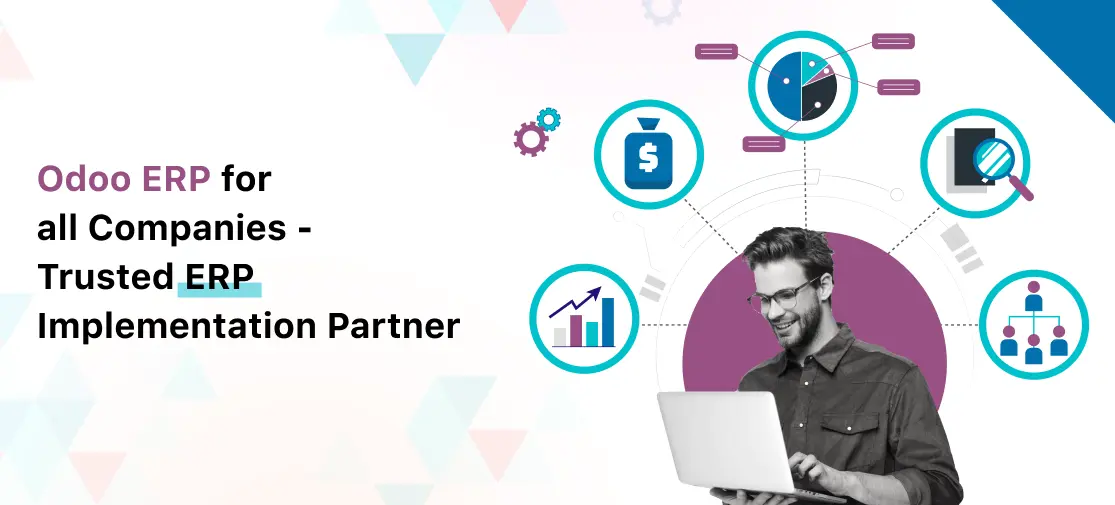Introduction
In the modern business landscape, efficiency, scalability, and data management are crucial for success. Enterprise Resource Planning (ERP) systems have become indispensable tools for companies aiming to streamline their operations. Among the plethora of ERP solutions available, Odoo has emerged as a popular choice. However, deciding between Odoo and other ERP solutions can be challenging. This blog will delve into the features, benefits, and drawbacks of Odoo compared to other ERP systems to help you determine the right choice for your business
What is Odoo?
Odoo is an open-source ERP platform that offers a diverse range of applications tailored for businesses of all sizes. It was designed to be flexible, modular, and user-friendly. Odoo's all-in-one approach means you can manage various business functions, such as sales, inventory, accounting, human resources, and customer relationship management (CRM), from a single platform. The highly customizable system allows businesses to tailor it to their specific needs.
The Importance of Choosing the Right ERP
Selecting the right ERP system is critical for any business. A well-integrated ERP can lead to improved efficiency, reduced operational costs, enhanced data visibility, and better decision-making. Conversely, a poor choice can result in operational disruptions, increased costs, and considerable waste of resources. Therefore, it's crucial to carefully evaluate your options.
Key Features of Odoo
1. Modular System
Odoo's modular design allows businesses to start with core applications and add more modules as needed. This scalability ensures that enterprises only pay for what they use, making Odoo cost-effective.
2. Open Source
Being open-source, Odoo provides businesses with the flexibility to modify the software according to their specific requirements. This adaptability is a significant advantage for companies with unique operational needs.
3. User-Friendly Interface
Odoo's interface is intuitive and straightforward, reducing the learning curve and facilitating speedy implementation across departments.
4. Integrated Applications
Odoo integrates various business processes, ensuring seamless operations and better data consistency across departments.
5. Community Support
As an open-source platform, Odoo has a robust community of developers and enthusiasts who contribute to its development. This community helps in keeping the software updated with the latest features and bug fixes.
Comparison with Other ERP Solutions
1. SAP
Strengths of SAP :
- Comprehensive Features : SAP offers extensive features and modules tailored for diverse industries.
- Industry-Specific Solutions : It provides solutions specific to industries like manufacturing, retail, and healthcare.
- Robust Support and Services : SAP has a wide network of partners and offers extensive customer support.
Drawbacks of SAP :
- High Cost : SAP can be expensive, making it less suitable for small businesses or startups.
- Complexity : The extensive features can make SAP complex, requiring knowledgeable IT staff for implementation and maintenance.
2. Oracle ERP
Strengths of Oracle ERP :
- Data Management Capabilities : Oracle is known for its strong data management and analytics capabilities.
- Cloud Solutions : Offers comprehensive cloud-based ERP solutions suitable for modern businesses.
- Scalability : Well-suited for growing enterprises looking for scalable solutions.
Drawbacks of Oracle ERP :
- High Implementation Costs : Implementation can be costly, both in terms of time and money.
- Resource-Intensive : Like SAP, Oracle ERP may require dedicated resources and staffing for effective management.
3. Microsoft Dynamics 365
Strengths of Microsoft Dynamics 365 :
- Integration with Microsoft Products : Seamlessly integrates with Microsoft Office tools and services.
- User-Friendly Interface : Familiar interface, especially for companies already using Microsoft products.
- Customizability : High level of customization to fit specific business needs.
Drawbacks of Microsoft Dynamics 365 :
- Licensing Costs : Licensing can be complicated and expensive, particularly for smaller organizations.
- Limited Third-Party Integrations : While integration with Microsoft products is excellent, third-party integrations can be limited.
4. NetSuite
Strengths of NetSuite :
- Cloud-Based : NetSuite offers a cloud-native ERP solution, providing accessibility and scalability.
- Real-Time Dashboards : Provides real-time analytics and dashboards for informed decision-making.
Drawbacks of NetSuite :
- Customization Limitations : While NetSuite offers customization, it may not be as extensive as other platforms like Odoo.
- Premium Pricing : Pricing can be higher, which may deter smaller businesses from adopting it.
Benefits of Choosing Odoo
- Cost-Effectiveness : Odoo's modular and open-source nature means you can tailor your spending according to your needs, making it an affordable solution.
- Flexibility and Scalability : Businesses can start with basic modules and add more as they grow, avoiding unnecessary features.
- Community-Driven Development : Regular updates and feature additions driven by a vibrant community ensure the software remains current and secure.
- Lower Implementation Time : Its user-friendly design facilitates quick implementation, saving businesses time and resources.
Challenges of Using Odoo
- Limited Out-of-the-Box Features : While customizable, Odoo may require additional development for businesses with specific needs.
- Community Reliance : As many features are community-driven, reliance on community updates can be a concern for businesses wanting guaranteed support.
- Customization Costs : While open-source, significant customization may require specialized developers, which can add to costs.
How to Choose the Right ERP Solution?
- Identify Your Business Needs : Analyze your business processes and identify the key areas that require improvement or automation.
- Evaluate Budget Constraints : Consider both the initial implementation and long-term operational costs.
- Consider Scalability Requirements : Choose a solution that can grow with your business, accommodating future expansions.
- Assess User-Friendliness : Ensure the ERP system is intuitive and accessible for all users across the organization.
- Check Support and Maintenance Services : Opt for a platform that provides reliable support and timely updates.
- Look for Integration Capabilities : Ensure the ERP solution can seamlessly integrate with existing tools and processes in your business.
Conclusion
Odoo stands out as a flexible, cost-effective, and scalable ERP solution, especially for small to medium-sized businesses. Its open-source nature and modular architecture provide significant advantages in customization and adaptability. However, larger enterprises or businesses with specific industry needs might find value in more comprehensive, albeit expensive, ERP solutions like SAP, Oracle, or Microsoft Dynamics 365.
Ultimately, the right ERP solution for your business will depend on several factors, including your specific requirements, budget, and future growth plans. It is crucial to conduct a thorough analysis and possibly consult with ERP experts to make an informed decision. Once chosen and implemented successfully, an ERP system can be a game-changer for your business, driving efficiency, reducing costs, and enhancing decision-making capabilities.




